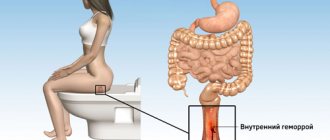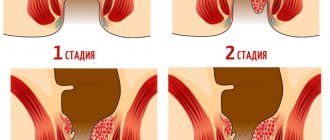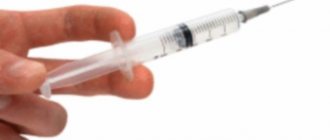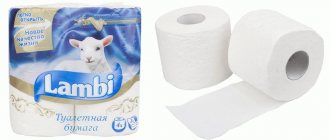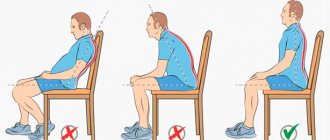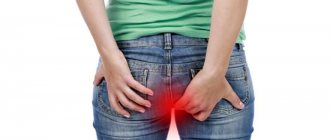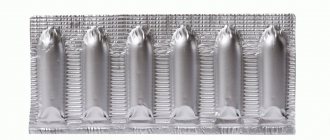Which antibiotics will be more effective for hemorrhoids?
Antibiotics for hemorrhoids are used in case of bacterial infection. Ointments, suppositories, antibiotic tablets help prevent purulent inflammation, necrosis and sepsis of the rectum.
Hemorrhoidal disease develops gradually, moving from acute to chronic form. Untreated and neglected pathology brings many physical and psychological problems.
A person feels pain and burning in the anus, bleeding appears, inflamed and swollen nodes make it difficult to even sit. Against this background, the development of an infectious process leading to suppuration and tissue necrosis is possible. It is impossible to do without adequate and comprehensive treatment.
Only antibiotics can help with hemorrhoids, eliminating bacterial inflammation and preventing sepsis.
Hemorrhoids cause severe pain and great discomfort
Hemorrhoids and antibiotics - treatment features
Hemorrhoids in most cases are treated conservatively. Systemic and local drugs are prescribed to relieve inflammation, hyperemia, pain, and improve blood flow in the vessels. In advanced forms, surgical intervention using minimally invasive or surgical methods cannot be avoided. To prevent serious complications, antibiotics are often used.
Antibiotics are a large group of drugs that effectively fight pathogenic microflora. They have a strong antibacterial effect, preventing the proliferation of bacteria and the spread of the infectious process. They are used in all areas of medicine, including proctology for the treatment of external and internal hemorrhoids.
Antibiotics are prescribed according to strict indications and only on the basis of thorough diagnosis.
Antibacterial treatment is necessary for the following conditions:
- frequent exacerbation of the disease with an inflammatory process in the rectum and intestines;
- erosions, cracks, wounds of the internal zone and perianal area;
- constant trauma to the mucous membrane with feces, which contain a large number of harmful microorganisms;
In order to prevent infection of affected intestinal tissues by bacteria, the use of antibiotics is indicated
- fistulas (openings) of the rectum with purulent contents;
- mechanical injury during proctological procedures;
- recovery after surgery to remove hemorrhoids;
- necrosis (death) of tissue due to impaired blood circulation;
- sepsis is infection of the entire body by microbes through the blood.
Rehabilitation after hemorrhoid removal surgery
Antibiotics play a fairly important role in antihemorrhoidal therapy.
They allow you to quickly stop the infectious process at the source of its occurrence, cleanse the pathological area of bacteria, and prevent the spread of pathogenic microflora to the entire rectum and neighboring organs. As a result, the acute phase of the disease recedes, the mucous membrane is restored, cracks and wounds heal, and tissues are quickly regenerated.
The inflammatory process of hemorrhoids is accompanied by painful symptoms. The mucous membrane swells, defecation becomes difficult, bloody discharge appears, body temperature rises, general malaise and severe discomfort in the anus are observed. Against this background, a purulent process may occur, and it is not far from serious complications - fistula and sepsis.
Treatment should not be neglected; if the doctor has prescribed antibiotics, they must be taken. Correct and timely conservative therapy is the key to a quick recovery without surgical intervention.
Antibiotics for internal hemorrhoids - tablets, injections
What antibiotics are most effective for hemorrhoids? Antibacterial therapy for hemorrhoidal disease involves several forms of drugs. They are selected by the attending physician depending on the patient’s condition and diagnosis. For internal pathology, systemic treatment with oral tablets and injections is most often necessary.
Broad-spectrum semisynthetic antibiotic of the tetracycline group
Taking antibiotics orally shows high effectiveness due to the holistic effect on the body and the microflora of the rectum, in particular. Inflammation of hemorrhoids and postoperative rehabilitation can be carried out with several popular drugs.
- "Doxycycline." A semi-synthetic antibiotic from the tetracycline group based on doxycycline hydrochloride. Available in capsules for oral administration. Active against many bacteria and harmful microorganisms. Take 1 tablet every 12 hours (2 times a day), with plenty of water. The duration of the treatment course depends on the severity of the condition, on average it takes 10 days. The drug is well tolerated; dyspepsia, allergies, and changes in blood counts rarely occur. Approved for use in adults and children over 9 years of age. During pregnancy and lactation, it is better to avoid treatment with doxycycline.
- "Furazolidone". Nitrofuran-type antibiotic with a synthetic composition. The product has a strong antimicrobial effect, allowing you to quickly stop the bacterial process in the intestine. In addition, it has some immunostimulating effects, thanks to which the body fights infection more effectively. The tablets are taken for 5 to 10 days. The standard dosage regimen involves 2 tablets 4 times a day, after meals. Can be taken by children and pregnant women under the strict supervision of a doctor. The drug is practically non-toxic, so adverse events rarely occur. Long-term use of high doses can cause nausea, vomiting, allergies, and cough. Contraindicated in case of liver and kidney dysfunction, lactose intolerance.
Furazolidone is an antibacterial drug
- "Gentamicin." Antibacterial agent in the form of a solution for intravenous and intramuscular administration. It is usually prescribed in the postoperative period to prevent infection of the wound surface. The nodes stop thrombosing, the pain goes away, and the wounds quickly heal. The daily dose is 3–5 mg per kilogram of weight, divided into several injections. The average course of treatment takes 7 days. Not used during pregnancy and breastfeeding, used with caution in pediatrics. The high toxicity of the drug requires use only as directed and under the supervision of a physician.
Antihemorrhoidal ointments and suppositories with antibiotics
Suppositories and ointments are widely used in the treatment of all forms of hemorrhoids. They are quite effective due to their targeted action directly in the pathological area.
When hemorrhoids become inflamed, they help well in combating painful manifestations, as well as in disinfecting and disinfecting the mucous membrane.
Some of them contain an antibacterial component that stops the infectious process.
This ointment is an indispensable assistant for surgeons, as it is able to quickly heal wounds and restore damaged tissues
- "Levomekol". Ointment for external use, which is used for purulent-inflammatory skin pathologies.
Prescribed in the complex treatment of external hemorrhoids, anal fissures and inflammation of the anus.
It contains the antibiotic chloramphenicol, a substance with a bacteriostatic effect.
It destroys harmful microorganisms at the site of application, helps heal wounds and cracks in the perianal area. A compress is made based on the ointment: sterile gauze must be lubricated with a thin layer and applied to the affected area, and changed the next day.
The duration of treatment takes on average up to 10 days. It is allowed to use during pregnancy in short courses.
- "Proctosedyl." Available in the form of rectal ointment and suppositories. Prescribed for the treatment and prevention of bacterial infection of internal and external cones, as well as proctitis and eczema. Framycetin (aminoglycoside) included in the composition has a local bactericidal and antimicrobial effect. The ointment is applied directly to the inflamed area or injected into the intestine with a special applicator, morning and evening for a week. Suppositories are inserted into the anus after defecation twice a day, for no more than 7 days. It is well tolerated, sometimes dry skin and burning occurs during application/injection. Prohibited for the treatment of pregnant women and children.
Treatment of hemorrhoids at home Proctosedyl has a pronounced antiallergenic effect and reduces itching
Side effects of antibacterial therapy
Antibiotics are a potent group of antibacterial drugs. Many of them have some toxic effect on the body.
Unpleasant consequences after therapy develop quite often, especially with uncontrolled use of drugs and unauthorized dosage changes. Ointments and suppositories usually cause allergic skin reactions that go away on their own.
But systemic drugs (tablets, injections) often provoke side effects in the form:
- nausea, vomiting, diarrhea, constipation;
- burning and itching in the anus;
- mucous, purulent, bloody discharge during bowel movements;
- headache, dizziness;
- impairment of vision, hearing;
- drowsiness, insomnia;
- thrombocytopenia, anemia;
- pain in muscles and joints;
- dysbacteriosis, candidiasis (thrush);
- dry skin and mucous membranes;
- kidney failure;
- secondary infection;
- bleeding from the gastrointestinal tract;
- anaphylactic shock, Quincke's edema.
Most reactions occur due to individual sensitivity to the components of the drug or overdose. If even minor side effects occur, you should consult a doctor; you may need to discontinue the medication.
Severe drug intoxication requires emergency medical care in a hospital setting.
Correct use of antibiotics for hemorrhoids and compliance with all doctor’s recommendations prevents unwanted reactions and complications.
When using antibacterial therapy, you should remember to take probiotics to restore intestinal microflora. For example, “Yogurt”, 1 capsule 2 times a day for the entire period of taking antibiotics, after finishing the course, drink for another 5 days.
Source: https://v-opte.ru/lechenie/antibiotiki-pri-gemorroe
Hemorrhoids and antibiotics - treatment features
Hemorrhoids in most cases are treated conservatively. Systemic and local drugs are prescribed to relieve inflammation, hyperemia, pain, and improve blood flow in the vessels. In advanced forms, surgical intervention using minimally invasive or surgical methods cannot be avoided. To prevent serious complications, antibiotics are often used.
Antibiotics are a large group of drugs that effectively fight pathogenic microflora. They have a strong antibacterial effect, preventing the proliferation of bacteria and the spread of the infectious process. They are used in all areas of medicine, including proctology for the treatment of external and internal hemorrhoids.
Antibiotics are prescribed according to strict indications and only on the basis of thorough diagnosis.
Antibacterial treatment is necessary for the following conditions:
- frequent exacerbation of the disease with an inflammatory process in the rectum and intestines;
- erosions, cracks, wounds of the internal zone and perianal area;
- constant trauma to the mucous membrane with feces, which contain a large number of harmful microorganisms;
In order to prevent infection of affected intestinal tissues by bacteria, the use of antibiotics is indicated
- fistulas (openings) of the rectum with purulent contents;
- mechanical injury during proctological procedures;
- recovery after surgery to remove hemorrhoids;
- necrosis (death) of tissue due to impaired blood circulation;
- sepsis is infection of the entire body by microbes through the blood.
Read also
How to properly use Vaseline oil for constipation?
Antibiotics play a fairly important role in antihemorrhoidal therapy. They allow you to quickly stop the infectious process at the source of its occurrence, cleanse the pathological area of bacteria, and prevent the spread of pathogenic microflora to the entire rectum and neighboring organs. As a result, the acute phase of the disease recedes, the mucous membrane is restored, cracks and wounds heal, and tissues are quickly regenerated.
The inflammatory process of hemorrhoids is accompanied by painful symptoms. The mucous membrane swells, defecation becomes difficult, bloody discharge appears, body temperature rises, general malaise and severe discomfort in the anus are observed. Against this background, a purulent process may occur, and it is not far from serious complications - fistula and sepsis.
Treatment should not be neglected; if the doctor has prescribed antibiotics, they must be taken. Correct and timely conservative therapy is the key to a quick recovery without surgical intervention.
Antibiotics for hemorrhoids - internal and external use, reviews
Antibiotics for hemorrhoids are used in case of bacterial infection. Ointments, suppositories, antibiotic tablets help prevent purulent inflammation, necrosis and sepsis of the rectum. Hemorrhoidal disease develops gradually, moving from acute to chronic form. Untreated and neglected pathology brings many physical and psychological problems.
A person feels pain and burning in the anus, bleeding appears, inflamed and swollen nodes make it difficult to even sit. Against this background, the development of an infectious process leading to suppuration and tissue necrosis is possible. It is impossible to do without adequate and comprehensive treatment.
Only antibiotics can help with hemorrhoids, eliminating bacterial inflammation and preventing sepsis.
Hemorrhoids cause severe pain and great discomfort
Causes
Manufacturers provide information about the side effects of drugs, so the instructions must state that the antibiotic can cause hemorrhoids. Sometimes the disease develops from the first days of treatment, but this is not indicated in the side effects. There are several cases when hemorrhoids occur:
- severe stage of the disease, in which the patient led a sedentary lifestyle for several months;
- taking antibacterial agents that cause diarrhea;
- abuse of dosage when taking an antibiotic;
- When taking the drug, the vascular system suffers, so severe pain appears in the anal area, indicating the initial stage of development of hemorrhoids.
Due to treatment with antibiotics administered intravenously, circulatory disturbances occur in the pelvic organs. The phenomenon is aggravated by the patient’s inactivity during the illness. Pensioners, representatives of the stronger sex after 45 years of age and women who are bearing a child are at risk. If the problem has made itself felt, then with a passive lifestyle, the symptoms of hemorrhoids will appear again.
Prevention of inflammatory processes in the intestines
Hemorrhoids in the vast majority of cases are accompanied by various types of inflammatory processes in the rectum. They can arise both from enlargement of hemorrhoids and from constipation, which often occurs with this type of disease. And, at the moment, the most reliable way to avoid illness is prevention.
In order to avoid getting hemorrhoids, it is not at all necessary to take pills, antibiotics or herbal decoctions. It is enough to follow a few simple tips that are recommended by all proctologists in the world.
- Firstly: balance your diet , make it rational. Healthy food will not only prevent the enlargement of hemorrhoids, but can also provide invaluable benefits in the early stages of the disease. You should exclude foods that disrupt intestinal function from your diet and add as many fresh vegetables and fruits as possible. Try to cook yourself, do not buy fast food. Do not drink alcoholic beverages, because they affect both the entire body and, first of all, the digestive system. Some people think that only drinks such as cognac, wine, vodka can cause harm, but no: even low-alcohol beer can cause irreparable harm to a person with hemorrhoids. You should also avoid various types of sausages, both hard smoked and raw smoked. They can create congestion in the pelvic area, which in turn will lead to irritation of the intestinal mucosa and inflammation. You should also minimize the consumption of tomatoes and cucumbers canned for the winter. Various kinds of pickles, pickled and spicy dishes can irritate the intestines weakened by disease. Include fresh or at least frozen vegetables and fruits in your diet. Eat fermented milk products every day, especially kefir and acidophilus.
- Secondly: drink at least two liters of fresh filtered water daily . This is necessary in order to avoid dehydration of the body and to soften fecal formations in the intestines.
- Third: move more. No matter how trite it sounds, movement is really life. The most common cause of hemorrhoids is a sedentary, sedentary lifestyle. The fact is that while sitting, blood rushes to the vessels of the small pelvis, as a result of which the pressure in the hemorrhoidal veins increases. Gradually increasing, it can damage the walls of blood vessels and, as a result, protrusion of hemorrhoids occurs. Walk more in the fresh air, do exercises in the morning. If you have a sedentary job, then take breaks about every half hour. It will be better if you devote your free time to light physical exercise. People who do not have the opportunity to leave their workplace, for example, drivers, can simply alternately tense and relax their buttocks. After work, go to the pool or gym. However, you should not be too zealous and engage in excessive sports, such as weightlifting. When lifting heavy weights, the pressure in the pelvic area can increase to extremely high levels, increasing the risk of hemorrhoids. As a preventative measure, special anti-hemorrhoid ring pillows should be used, which, due to the specificity of their shape, facilitate blood circulation in the pelvic area.
- Fourth: observe all rules of personal hygiene . Wash your hands thoroughly with soap before and after eating, shower daily, take a bath at least once a week, and rinse the area around the anus with cold water after each bowel movement. Do not use too hard and thick toilet paper; choose expensive multi-layer varieties. If you are predisposed to hemorrhoids, take baths with manganese or sea salt every evening - these substances improve blood circulation and help thin the clots that form in the hemorrhoids.
- And fifthly: do not use too much force when defecating , so as not to cause rectal bleeding. Residents of rural areas should be sure to equip a toilet in the house, since in winter the risk of poor circulation in the anus due to hypothermia increases. Be sure to wash yourself after each bowel movement. This is not only pleasant, but also very useful.
By following these basic rules, you will never get inflammation of hemorrhoids and will be healthy.
Antibiotics for hemorrhoids: use and benefits
Antibiotics for hemorrhoids are prescribed by a doctor after a thorough diagnosis and collection of tests. What is known about the drugs that are prescribed for the inflammatory process?
Source: https://gb4miass74.ru/zabolevaniya/antibiotik-pri-gemorroe-tabletki.html
Release forms
Antibiotics for hemorrhoids are available in various forms:
- ointments and suppositories applied topically;
- capsules and tablets for oral use;
- solutions for intravenous or intramuscular administration.
Local preparations are often used simultaneously with the tablet form. For severe inflammation, injections are prescribed. If treatment is started in a timely manner, preference is given to suppositories, ointments for hemorrhoids with an antibiotic, and tablets. These forms prevent the proliferation of bacteria and reduce the severity of the main painful symptoms.
Ointments
Ointments for hemorrhoids are used to provide a local effect.
They contain various components that can reduce inflammation, pain, and stop bleeding. Also today you can find venotonic ointments that help reduce the size of nodes. Ointments for the treatment of hemorrhoids have a good therapeutic effect. At the same time, they are completely safe, since they affect the body locally. This form is often approved for use by expectant and nursing mothers.
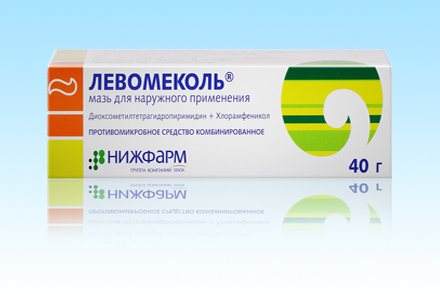
Ointments are practical, simple and easy to use. They are prescribed in the early stages, before large nodes form. It is advisable to apply the product after defecation, lubricating the walls of the anus from the inside without rubbing, or use a tampon soaked in ointment.
One of the most popular antibiotic ointments for hemorrhoids is Levomekol. The ointment preparation resists anal infections, quickly reduces inflammation, and promotes tissue regeneration. Levomekol contains the antibiotic chloramphenicol, as well as a component that promotes healing, methyluracil.
You should use the ointments for no more than ten days. At the same time, it is necessary to follow a diet and lead an active lifestyle.
The best effect from the use of ointments occurs when treating the external form of the disease. Antibiotics for internal hemorrhoids are best used in the form of suppositories.
Suppositories
It is usually more difficult to cure internal suppuration than external one. Antibiotic suppositories for hemorrhoids are highly effective in treating the disease. Not only are they ways to directly influence the cause of discomfort, but they can also eliminate it in just five to seven days. The active substance contained in suppositories is quickly absorbed through the mucous membrane into the blood and has a long-lasting effect. Suppositories are best used before bedtime.
One of the popular antibacterial suppositories is Proctosedyl. The substances included in its composition have a wide range of applications and negatively affect a large number of pathogenic microorganisms, have an antipruritic and anesthetic effect, reduce inflammation, prevent the occurrence of thrombotic complications, and improve the elasticity of capillaries.
Hepatrobin G is an antibacterial drug available in various forms (ointment and suppositories). Can be prescribed for acute and chronic forms of the disease. Usually the course of administration is at least fourteen days, suppositories are used twice a day. The medicine relieves inflammation, eliminates unpleasant symptoms, and reduces pain.
Important! When choosing which antibiotics to take for hemorrhoids, you should know that the disease is more effectively treated in a comprehensive manner (using topical medications and tablets at the same time).
Tablets and injections
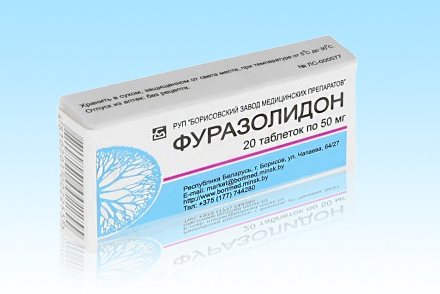
Popular medications for hemorrhoids in tablet form include Tetracycline and Levomycetin (take 500 mg three to four times a day). Proctologists also often prescribe Furazolidone and Doxycycline, medications whose effectiveness is based on the destruction of dangerous microorganisms. Such medications should be taken after meals to minimize the harmful effects on the gastrointestinal mucosa.
The drug Gentamicin is represented by ointments and injection solutions used in the treatment of hemorrhoids. However, doctors resort to such treatment only in advanced situations with severe inflammation accompanied by elevated temperature for a long time.
Antibiotic suppositories for hemorrhoids: indications and contraindications
In addition to unpleasant sensations in the anal area in the form of burning, itching, pain and discomfort during defecation, hemorrhoids can cause complications to its owner, sometimes life-threatening. Often the complication is associated with the proliferation of opportunistic flora, which is abundantly represented in the rectum.
Especially often, suppuration occurs in the presence of a defect in the form of a crack or after surgery, when microbes have access to the wound. The result can be proctitis, paraproctitis, inflammation of nodes, and the formation of fistulas. The most serious complication is sepsis, that is, blood poisoning with the development of multiple organ failure, which often results in the death of the patient.
Antihemorrhoidal ointments and suppositories with antibiotics
Suppositories and ointments are widely used in the treatment of all forms of hemorrhoids. They are quite effective due to their targeted action directly in the pathological area. When hemorrhoids become inflamed, they help well in combating painful manifestations, as well as in disinfecting and disinfecting the mucous membrane. Some of them contain an antibacterial component that stops the infectious process.
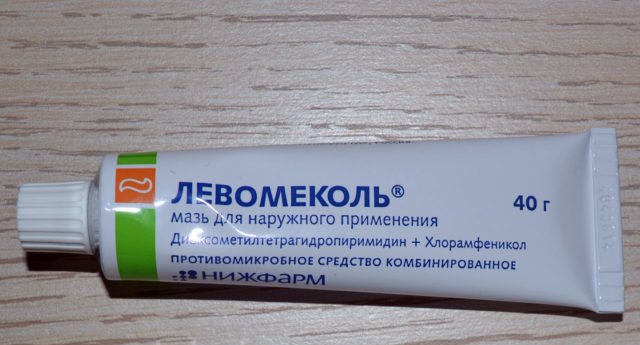
This ointment is an indispensable assistant for surgeons, as it is able to quickly heal wounds and restore damaged tissues
- "Levomekol". Ointment for external use, which is used for purulent-inflammatory skin pathologies. Prescribed in the complex treatment of external hemorrhoids, anal fissures and inflammation of the anus.
It contains the antibiotic chloramphenicol, a substance with a bacteriostatic effect. It destroys harmful microorganisms at the site of application, helps heal wounds and cracks in the perianal area. A compress is made based on the ointment: sterile gauze must be lubricated with a thin layer and applied to the affected area, and changed the next day. The duration of treatment takes on average up to 10 days. It is allowed to use during pregnancy in short courses.
- "Proctosedyl." Available in the form of rectal ointment and suppositories. Prescribed for the treatment and prevention of bacterial infection of internal and external cones, as well as proctitis and eczema. Framycetin (aminoglycoside) included in the composition has a local bactericidal and antimicrobial effect. The ointment is applied directly to the inflamed area or injected into the intestine with a special applicator, morning and evening for a week. Suppositories are inserted into the anus after defecation twice a day, for no more than 7 days. It is well tolerated, sometimes dry skin and burning occurs during application/injection. Prohibited for the treatment of pregnant women and children.
Read also
Hydrogen peroxide for hemorrhoids
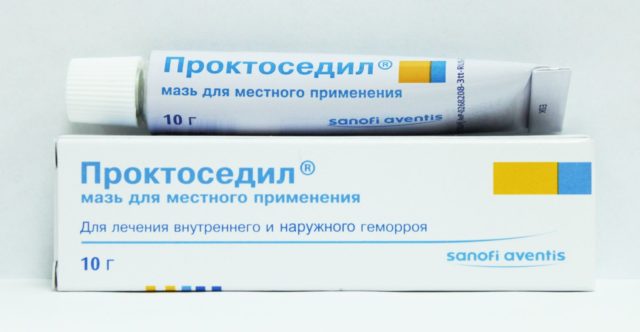
Proctosedyl has a pronounced antiallergenic effect and reduces itching
Antibiotics for surgery
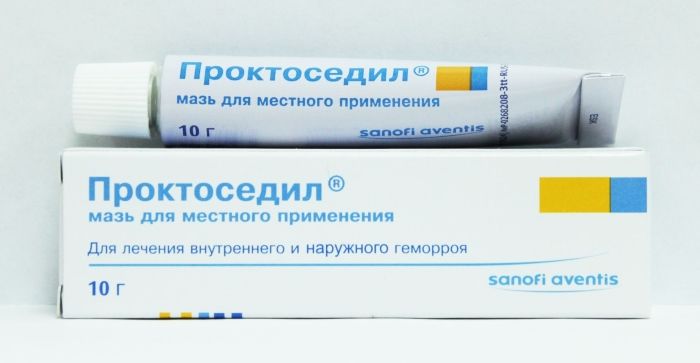
It would seem that the focus of the pathology has been removed, the operation was successful, and there are no complications, why take these medications? The fact is that during surgery, a wound surface is formed, which is constantly in contact with feces, so there is a high probability of postoperative complications. This is precisely why doctors always prescribe antibacterial drugs for 5–7 days, and more often in injectable form.
In many cases, the medications taken save the patient - hemorrhoids, although not a life-threatening disease, can pose a certain threat. For example, the appearance of pus in the stool or blood discharge from inflamed hemorrhoids indicates the beginning of the process of suppuration, and this is a direct path to the formation of fistulas. If it is not possible to remove them surgically, then another complication - sepsis - often ends in death.
Self-prescription of antibacterial agents for the treatment of hemorrhoids is fraught with serious consequences - from an allergic reaction to the development of dysbacteriosis. Therefore, such medications should be selected by a doctor who will have the results of the patient’s examination and medical history.
Indications for the use of antibacterial therapy for hemorrhoids
Antibiotics for hemorrhoids are not pathogenetic drugs. The drugs are appropriate for relieving complications of hemorrhoids after secondary infection of fissures, various wounds, erosions and thinning of the mucosa. Prescribing antibacterial therapy is the prerogative of the doctor.
The flora that caused the exacerbation of hemorrhoids is different. Therefore, before prescribing an antibiotic, a bacteriological analysis is carried out to determine the sensitivity of the pathogen from the lesion that provoked the exacerbation to a specific drug.
If the symptoms are serious, there is a tendency for infection to spread or suppuration, broad-spectrum antibiotics in tablets or parenterally (Ceftriaxone, for example) are prescribed until the test result is obtained.
Indications for the use of antibacterial drugs for hemorrhoids are:
- hyperthermia over 38˚C;
- suppuration from the anus;
- inflammation of anorectal fissure;
- paraproctitis, abscess formation, sepsis;
- purulent rectum fistulas;
- node necrosis due to thrombosis or strangulation;
- injury to the rectal mucosa, including during surgical procedures;
- prevention of predicted complications during the rehabilitation period after surgery;
- left shift in the leukocyte formula of the blood.
When prescribing antibiotics, an allergy test is always performed.
